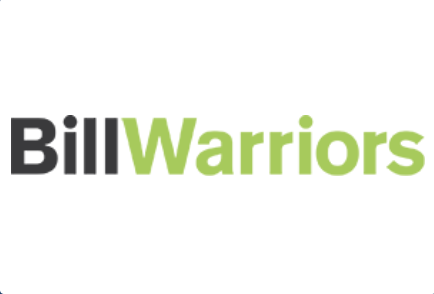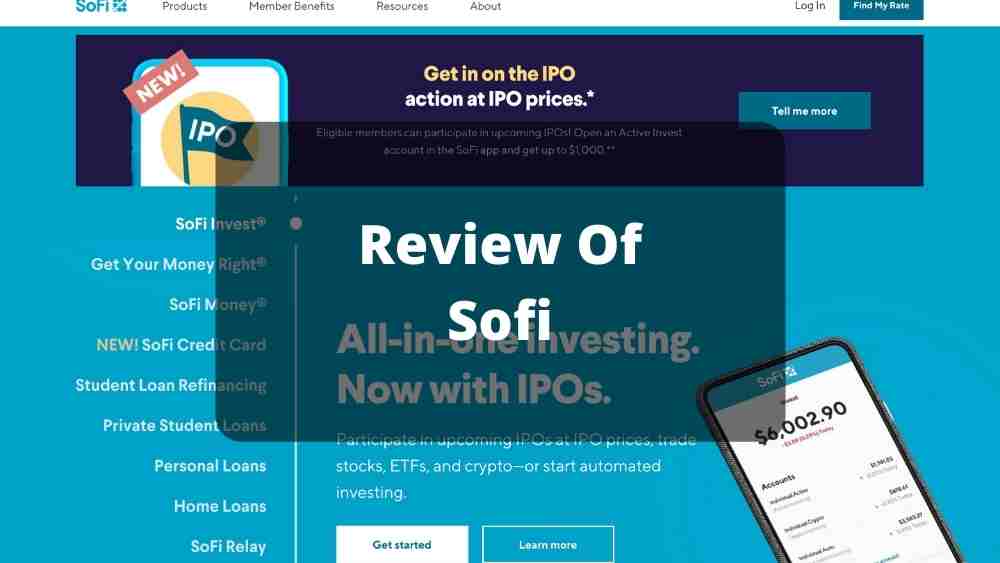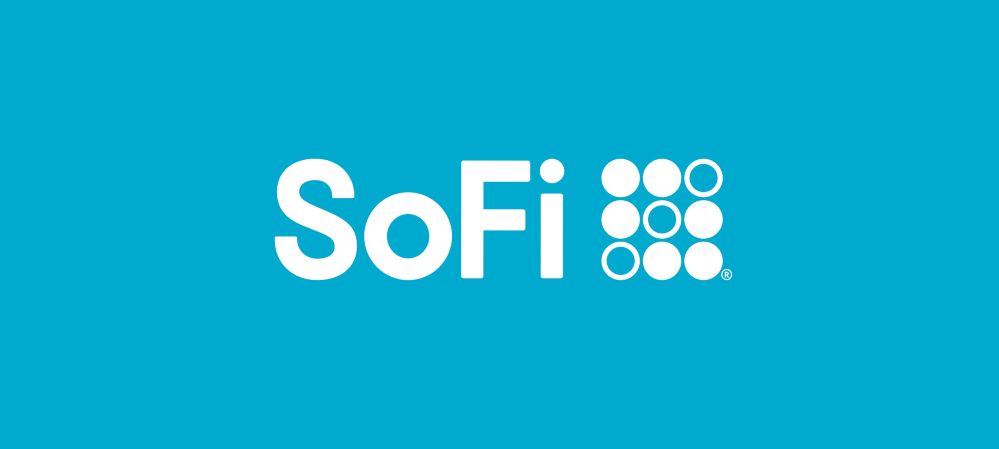Going to college, buying a new home or car, or getting into graduate school are major accomplishments worth celebrating that certainly mark exciting new chapters in our lives. While these are all positive endeavors that undoubtedly lead to great opportunities, they are also serious financial commitments that we often must borrow money to pay for.
It can be very daunting to take out a loan and highly stressful to pay a loan off if you aren’t adequately informed about the best way to go about choosing a loan company and plan that best fits your needs. Luckily, plenty of lending companies have developed loan payment strategies to help you pay off your loans as efficiently as possible, considering your finances and lifestyle.
SoFi is one such lending company. This article is a SoFi review covering general information about how SoFi operates, the advantages and drawbacks of taking out a loan with SoFi, and customer experiences.
Table of Contents
- General Information About SoFi
- The Pros of SoFi
- The Cons of Sofi.com
- Overall Reputation and Reviews for SoFi
- Q & A
- Conclusion
General Information About SoFi
Social Finance Inc., or SoFi for short, is a personal finance company that services the United States. They offer various services, including personal loans, student loans, mortgages, loan refinancing, investing, trading, and banking options. All of their services can be set up, accessed, and managed online from a mobile device.
SoFi was founded in 2011 by four Stanford business students whose mission was to supply more accessible loan options for students who needed assistance in financing their education. The company started with a pilot program that had a $2 million budget that they divided amongst 100 students in the form of $200K loans.
Their initial $2 million quickly grew exponentially over the years. By 2013, SoFi had 2500 borrowers and lent $200 million, not to mention it had accumulated more than $500 million in funds from outside investors. Today they are valued at $9 billion and have over 1.8 million members with $50 billion in funded loans and more than $22 billion in debt paid off by its members.
How SoFi works
While SoFi now offers numerous different financial products, we will focus on SoFi’s loan services for this article. You can apply for a variety of loans with SoFi at a competitive variable or fixed interest rates that range from 2.13% to 7.49% for loan refinancing and 1.78% to 11.89% for private student loans.
They offer loan plans that include 5, 7, 10, 15, or 20 year duration periods to pay off a loan. Loan amounts start at $5k with personal loans of up to $100k.
In terms of student loans, which is how SoFi got its start and good reputation, SoFi works by letting students take out private loans or refinance their old loans. Borrowers communicate which loans they need help paying off, and SoFi loans them the money to pay them off.
The borrower pays off the old loan with SoFi’s loan and commences to pay off SoFi’s loan at the agreed-upon interest rates, which are generally considerably lower than competitor refinancing companies.
VIDEO: How I Paid Off $225,526 In Student Loans In 2 Years (Featured Sofi Customer Story)
The Pros of SoFi
SoFi comparisons with other big lenders reveal that they offer competitive rates and plenty of notable perks that help them to stand out as a reputable 5-star lending option. While there are plenty of benefits to choosing SoFi, we will focus and expound upon the advantages listed below:
- No or low fees and payment deferrals
- Offers co-sign and joint loan options.
- Offers unemployment protection
- Borrowers become members and get special benefits which include a wealth of additional resources like career planning, job search assistance, and entrepreneurship support available.
1. No or Low Fees and Payment Deferrals
SoFi does not require any fees to take out a loan, unlike other companies that have late fees, prepayment penalties, or origination fees. In fact, they will reward you with .25% off your interest rate if you decide to set up automatic payments, and you get a $150 bonus just for taking out a loan in the first place.
While many no-fee loans may have the unfortunate catch of charging higher annual interest rates, SoFi’s annual interest rates remain low. This gives SoFi a top-tier, five-star score as one of the best companies for taking out a student loan.
SoFi also lets you defer loan payments while studying or serving in the military, which means you do not have to start paying the loans off until after you graduate or complete your military duty tour.
2. Offers Co-Sign and Joint Loan Options
Taking out student loans is especially scary for young adults as they have been dependent on their parents for financial assistance up until college. SoFi lets you keep that financial bond and security you have with your parents by allowing for co-signing and joint loan options.
If a parent, guardian, or loved one co-signs the loan, then both you and they are responsible for paying the loan off. If it takes you longer than expected to find a job after graduating from college, having your parents as a co-signer is a great safety net as they can take on your debt until you find a stable income. Approximately 15% of SoFi borrowers have a co-signer on their loan.
The only drawback with co-signing on loans is that SoFi does not allow you to release the co-signer from liability if you decide you want to be the sole borrower.
3. Offers Unemployment Protection.
We take out loans with the expectation of a steady paycheck and a good job to consistently pay them off over the agreed-upon period. However, unexpected circumstances occur that may leave us unemployed. This pandemic is a perfect example, leaving millions of hardworking Americans in high-paying, stable jobs to suddenly find themselves furloughed or laid off.
SoFi has incorporated stipulations to their loan programs that help their borrowers out during periods of unemployment. Suppose you are suddenly and unexpectedly let go and find yourself unemployed. In that case, SoFi’s unemployment protection plan places your loan into forbearance, meaning that they will temporarily suspend your loan payments due to economic hardship.
SoFi offers forbearance for an entire year if you need it, and any other loans you may have taken out through SoFi are subject to reduced interest rates. While this is certainly a perk, it doesn’t mean that it won’t have consequences with paying off your loans in the long run, as you may end up taking longer to pay off loans once repayment resumes.
4. Members Get Special Benefits
When you take out a loan with SoFi, you become a member. Members have a wealth of additional resources at their fingertips, including career planning consultations, guides on how to search for jobs, and entrepreneurship support.
You can meet with a personal career advisor for a one-on-one consultation on looking for a job, making a career change, or how best to market yourself to potential employers or clients. There are also group events such as workshops, lecture series, and networking happy hours. There are countless blog posts, YouTube videos, and a thorough customer support page online at your disposal if you are more into self-paced learning.
The Cons of Sofi.com
While SoFi has a good reputation for offering low-interest rates and plenty of member benefits, there are a few drawbacks to their services that they could stand to improve or address. Our main criticism points when looking at SoFi comparisons to other lenders are as follows:
- Slower Funding Process
- High Credit Score Required for Loan
- SoFi Faced FTC Charges
- The Business is Expanding and Diversifying Services
1. Slower Funding Process
While SoFi is an automated service that provides members with a user-friendly interface along with multiple mediums of communication with SoFi’s support team, the process for being approved and receiving a loan is longer than many of their competitors.
Other lending companies may provide funds the instant that you apply and receive approval for the loan. With SoFi, loan application, approval, and financing are three separate processes, each with a waiting period.
They do an in-depth background check on you when reviewing your application, which can take a week or two before they even approve you. Once you receive approval for a loan, you might not see funds arrive until at least three days later, but on average, it takes an entire week.
2. High Credit Score Needed for Approval
The minimum credit score for loan application approval from SoFi is 670. There have been many complaints about being rejected with credit scores of 750 or higher, so it’s safe to say that SoFi has very high standards and specific requirements that borrowers must meet to get their loans approved. SoFi was initially deemed a good fit for taking out law and medical school loans because the majority of SoFi’s clients earn at least 100K dollars a year.
3. They Faced FTC Charges
In October of 2018, SoFi faced charges of misrepresentation from the FTC for making false claims that overestimated how much you could save when refinancing with them. SoFi manipulated data to achieve misleading average prices, payments, and savings claims on their website that violated the FTC act. While the charges were settled and resolved, they still manage to tarnish SoFi’s reputation for transparency.
4. The Business is Expanding and Diversifying Services
SoFi is not just a lending company anymore as they have added and continue to add other financial services. In 2018 they introduced SoFi invest, which is now known as SoFi Active investing, that allows stock and ETF trading and provides investment advice through an online platform called SoFi Automated Investing.
In 2019 SoFi began offering cryptocurrency trading by collaborating with the exchange platform Coinbase. Lastly, the most recent addition of online banking in the fall of 2020 lets users manage their money by storing it in a checking or savings account along with its own debit card for easy access. By the summer of 2020, SoFi came out with a credit card option as well.
While diversifying service offerings sounds like a positive development for SoFi, it also means that they do not solely focus on loans anymore. This may lead to less attention to detail or one-on-one help with loans as their focus becomes more dispersed.
Overall Reputation and Reviews for SoFi
SoFi receives an A rating from Better Business Bureau, but they receive a meager rating of 1.4 out of 5 stars from customer reviews. The complaints are scathing and stem from poor communication, unsafe practices of asking for personal information over email, and lengthy loan application processing times.
Reviewers on Trustpilot likewise gave a SoFi rating of 3.3 out of 5 with similar customer service complaints and even more negative comments about potential clients being rejected for loans. Many complained that there was no reason for rejection as their credit score was good, and they fulfilled all other requirements SoFi demanded to get a loan.
On the other hand, Reddit users commended SoFi for its responsive and helpful customer service and the one-on-one phone help they got from loan officers. They also liked the quick turn-around rate for approval, stating that they were approved in 3 business days or less for the most part.
Sofi Video Reviews
Q & A
If you still have some questions, we’ve put together some of the most frequently asked questions that people have before applying for a SoFi loan.
Which States Does Sofi Operate In?
Sofi is a widespread agency, and you can find their services in the following states:
- Alabama
- Alaska
- Arizona
- Arkansas
- California
- Colorado
- Connecticut
- Delaware
- District of Columbia
- Florida
- Georgia
- Idaho
- Illinois
- Indiana
- Iowa
- Kansas
- Kentucky
- Louisiana
- Maine
- Massachusetts
- Michigan
- Minnesota
- Mississippi
- Montana
- Nebraska
- Nevada
- New Hampshire
- New Jersey
- North Carolina
- North Dakota
- Ohio
- Oklahoma
- Oregon
- Pennsylvania
- Rhode Island
- South Carolina
- Tennessee
- Texas
- Utah
- Vermont
- Virginia
- Washington
- Wisconsin
- Wyoming
Which Type of Loans Does SoFi Offer?
We will list the types of loans and their subsets below:
- Student loans
- Private student loans
- Undergraduate student loans
- Parent Plus Refinancing
- Graduate Student loans, i.e. MBA, Law, and Medical student loans
- Dental and Medical resident refinancing loans
- Student loan refinancing
- Personal Loans
- Home Loans
- Auto Loans
You can co-sign with a parent, family member, or another household member on a loan, rendering both of you responsible for payments. This can be very helpful for students who may not have job stability or prospects upon graduating from college. It can also be a significant liability if one of the borrowers cannot hold up their end of the deal because it can seriously damage your credit score.
Unfortunately, SoFi does not allow for a co-sign release, so if you decide to co-sign, it is a binding and intractable agreement for both borrowers.
How Do I Qualify for SoFi Loans, and Do They Require a Credit Check?
SoFi does a soft credit check, which does not affect your credit score. They have pretty high standards for requirements and good to excellent credit scores. Loan approval requires a credit score of at least 700. Other requirements are listed below:
- You need to be a US citizen, permanent resident, or have a green card
- You must be a legal adult
- You must have proof of employment with a high income (average income for loans is $100k). In lieu of proof of employment, you can provide a job offer to start within the next 90 days.
- If you are a student, you must be enrolled at least half-time in school at a 4-year accredited university.
- DACA recipient or non-permanent resident visa holders have to co-sign with a US citizen
Obviously, for private student loans, there are other qualifications that look at your parent’s financial background and do not specify a minimum income or a debt-to-income ratio. Once they consider your financial situation and approve you, they will reveal the interest rates you qualify for on your loan.
If your loan application gets rejected, SoFi will explain the reasons for your rejection so that you can resolve those issues or look for lenders with lower standards for credit scores.
How Much Does SoFi Cost?
SoFi doesn’t charge any fees on their loans and has low-interest rates. Setting up your loan along with all additional features like career coaching, personal advising, and group events are all free of charge.
The only payments you make are the monthly loan payments that differ depending on your interest rate and which payment plan you choose. There are 5, 10, and 15-year plans for private student loans, and for other loans like refinancing, you can take as little as 2 or as many as 20 years to pay off the loan.
Conclusion
Based on our SoFi review, it is an excellent option for student loans, personal loans, and refinancing. They offer no additional fees, low-interest rates, flexible payment plans, and a plethora of career planning and financial advising resources.
Their loan qualification requirements are considerably prohibitive as you must have a credit score of at least 700 along with a high-paying, stable job. Consequently, SoFi is best for law, medical, and business students who will ostensibly be making high salaries as professionals.
SoFi wants to make your loan process as painless and well-informed as possible so that you can achieve your dreams no matter what they might cost. Financial hurdles are never easy, but SoFi strives to help you deal with them in the most manageable way.


